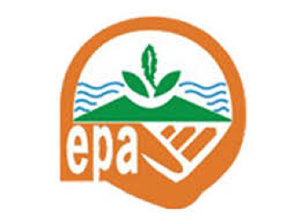 Logo of Environmental Protection Agency
Logo of Environmental Protection Agency
Mr Larry Kotoe, a Deputy Director at the Environmental Protection Agency has urged fishermen to begin proper records keeping to ensure that they did not miss out on the right to compensation and insurance should danger or damage occurred.
He stated that elsewhere in the world, Fishermen paid taxes and so had good affections in officialdom but not in Ghana which called for internal book keeping mechanisms by the various fishermen groupings to aid in compensation or insurance in the event of oil spill along the beaches of the country.
Mr Kotoe said, “let begin to prepare ahead of time because these international agencies pay claims of damage or destruction based on records”.
The EPA official was speaking at a stakeholder engagement on the National Oil Spill Contingency Plan to solicit citizens’ views on revising the National Plan.
Currently, dissipates were used to control such spills with their adverse environmental impact.
A National Oil Spill Contingency Plan has also been formulated to provide the framework for the coordination of an integrated response by government agencies and relevant stakeholders to protect the environment from the effects of pollution from spillage of oil substances.
Fishermen have also complained about the restriction of their activities around the offshore oil and gas installations and these were impacting their fish landings.
It is against this background that Friends of the Nation and Oxfam with support from the Norwegian Agency for Development Co-operation (NORAD) has been engaging the Environmental Protection Agency and other stakeholders to revise the National Oil Spill Contingency Plan (NOSCP) to identify the gaps and make recommendations for better.
This would help towards putting Ghana in a better position to maximize benefits from the petroleum sector as significant efforts have been made to ensure sound governance including transparent and efficient management of petroleum revenues.
Mr Solomon Ampofo, the Natural Resources Coordinator with Friends of the Nation lauded the enactment of the Petroleum Revenue Management Act 2011 (Act 815), as amended Act 893, 2015; Petroleum Commission Act 2011 (Act 821) and Petroleum (Exploration and Production) Act, 2016, 919 as well as the Local Content and participation regulations.
He said these efforts have been lauded as signs of a country working hard to avoid the curse of oil, the experience in many oil-producing countries in Africa, where oil and gas resources have brought conflicts, corruption, and poverty.
Mr Ampofo added that potential danger for environmental damage and destruction continues to be a topical issue that needed holistic attention.
The risk of tension according to him was increasing and there was the need to institutionalize sub-national and national platforms to discuss improved ways of governance of the sector.
So far, total revenues accruing to the state by end of December 2020 is US$ 6.55 billion as an oil fund.
Mr Ampofo added, “This is needed, the sooner; the better but even more important is the need to mobilize, equip and draw experiences from oil communities.”
Mr Francis Agibere, a Personnel from Oxfam stressed the need for the country to learn from best practices elsewhere to improve upon the sector.
The revised plan looks at the change in risk profile, funding to implement the plan, stakeholders’ education, training, and capacity building, and coastal sensitivity mapping among others.
Participants stressed the need for the government to commit more to the plan and its implementation, more education on the plan for fishermen and all those in the Marine value chain.